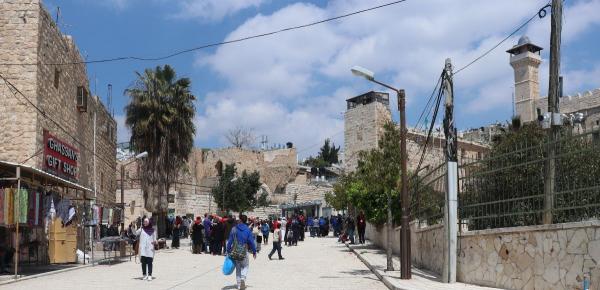
As I* was preparing to suddenly come to Hebron, I started to do some research about the city. One of the things that I took notice of is that Hebron is the largest city in the West Bank in terms of population and size. However, had I not read that fact before arriving, I would have thought someone was joking with me. When I first walked through the Old City, the Ibrahimi Mosque, and into the rest of the H2, I felt like I was walking into a ghost town.
Living in the Old City of Hebron and monitoring human rights abuses in the H2 area of the city offers a very different picture. One of the local Palestinians who gave us an orientation explained that the Old City and the H2 area used to be the economic heart of Hebron.
After a massacre during prayer time at the Ibrahimi Mosque was committed by an Israeli-American in 1994, the Israeli government enforced the closure of Shuhada Street, hundreds of stores, the heavy Israeli Military presence for about 750 settlers within the city, and the division of the Ibrahimi Mosque between Muslims and Jews (with Jews having a larger section). So now, 20% of Hebron is controlled by the Israeli Military Forces and, over time, there has been a significant drop in the numbers of Palestinians and tourists that come to this area anymore. The Old City was especially affected after the Second Intifada from 2002 to 2003. Israeli soldiers implemented curfews in which one of the effects was that shopkeepers were not allowed to open their stores. This led to many of the shopkeepers shutting their stores, opening new ones in the H1 sector of Hebron and other areas, customers going elsewhere. Also many people choose to avoid the Old City because Israeli soldier presence saturates the area.
However, for a few days in the year, the atmosphere in the Old City transforms because of access to one of the holiest sites in Islam, the Ibrahimi Mosque. For ten days of the year, on special holidays, Muslims have access to most of the Ibrahimi Mosque and vice versa for Jews for ten days.
On April 3, 2019, it was the Islamic holiday of Al Isra’a Wal Mi’raj. The Israa and Miraj refer to two parts of a miraculous journey that Prophet Muhammad took in one night, from Mecca to Jerusalem and then ascension to the heavens. Muslims from all over Palestine and other parts of the world came to pray. I had never seen the Old City and souk area bustling with so much life before. Many people were streaming through the souk and engaging with storeowners as they were walking towards the checkpoint near the mosque. Vendors that I had never seen before suddenly showed up and packed into whatever space they could find, selling souvenirs, embroidery work, boiled corn, and ice cream. Deserted garden spaces were suddenly filled with children running around, families taking pictures, some taking refuge in the shade, and some people turning an empty fountain space into seating.
One of the shopkeepers in the Old City shared his thoughts after seeing the souk so alive.
“To be honest with you, every shopkeeper, we were so happy to see people coming back to the Old City. A lot of ladies, they brought their kids to visit the Old City and visit the Mosque
It was really crowded and busy and active. It’s like the old time; we remember the old time. And we want that to be all the time. Not just for one day in a year.”
“Hebron, it used to be in the old days the main city for every Palestinian from all over the West Bank and from Gaza Strip. Bedouin villagers used to come down to this market, the main market, to buy their goods, to do their shopping and to pray in the Ibrahimi Mosque and to leave late in the afternoon and evening. Not anymore because the Israeli attitude, in a way, is to kick us outside here and take over. But we are strong and we got used to all this and we are determined to stay. We are not going to give up as long as we live. And I encourage everybody from all over the world, from all over Palestine to come down to this market to make it like what it used to be, like more to make it active and crowded and busy because they could pick up nice stuff and good stuff and cheaper prices, high quality because you see we don’t pay tax and taxation. And it’s safe and secure; it’s nice. The Old City is really nice.”
*We do not attribute articles written by Palestine CPTers, because doing so might result in the Israeli government banning them from returning to join the team.



